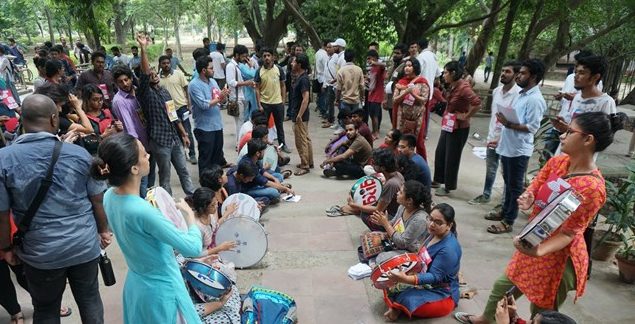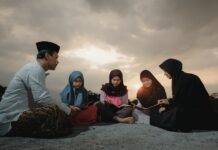DK, a PhD student in the social sciences, JNU, is frantic. The PM’s broadcast to the nation the previous day suggested that finally the Coronavirus was getting traction in government circles. Another broadcast is slated for Sunday. Her parents are really worried. The state she is from – Kerala – was the first in India to respond to the world wide panic that the virus has aroused. Not surprising, given the people centric policies of the communist government, and the high rates of literacy in the state. Further, given that a fairly large chunk of the population – an estimated 1.6 million of a total of 32 million – work overseas, the fear of them carrying the virus from the hotspots of West Asia in particular was acute. A responsive government means a responsive citizenry, and responsible measures in place. On Friday, DK was summoned back home by her parents, while the central government was still playing out its options on how seriously to take the virus. Should she go, given that the University was still open? Even if she did, there was talk of all incoming travellers being kept in detention. Was that worth the effort and expense. Yes, her parents said – any day being in Kerala was a better option than being in the Gangetic heartland. At least she would get medical attention if necessary. What seemed like the reaction of overprotective and anxious parents has proven to be a reality, given the grim scenes of detention facilities that are being beamed from various parts of Delhi, UP and other northern Indian states. What is particularly sad is the vulnerability of the frontline workers – the doctors and nurses in these regions, as obviously this is going to impact the medical outreach. DK is safe at home for the past 45 days, and repeatedly says that if it were not for her parents’ insistence, she would not be safe now. Perhaps an exaggeration, but a fear that is real for many who did not have the options she had.
Public universities such as JNU should have been in the front at least since early March, reaching out to the government, academic community and the general public to explain why this virus was just not any other virus, but one that needed to be taken seriously. Unfortunately, this was not the case. Other than individual efforts through writing in newspapers or appearing in television broadcasts, the medical fraternity was also not at its sharpest in keeping with the happenings globally. Hence, it was only in the third week of March, after many countries had lost tens of thousands of lives, that a complete lockdown was announced. Again, university administration dithering in different parts of the country led to complete chaos. Office orders regarding shutting down hostels completely, evicting students, stoppage of mess facilities fueled fear and uncertainty in a premier institution like JNU. Hundreds rushed home, travelling in jam-packed trains and buses. Those who could afford air travel were in a race as airlines were cancelling flights.
LR, also a PhD student from JNU, decided to take the risk of the long journey back home to Pondicherry. Managing to squeeze into a Tamil Nadu bound train on a second class ticket, she was for most part of the journey jostled by a moving population that was panic stricken, travelling ticketless, and obviously frantic to reach home by hook or by crook. Having to change trains in Chennai, he finally reached home travel weary and hungry. LR is a scholarship holder whose family depends on her. Unable to get her scholarship for the past few months due to some official holdups, she could not send money home. She had somehow borrowed money for her ticket, and could not wait to get a meal inside her stomach. However, her astonishment upon reaching home and shortly thereafter on seeing local government officials was compounded by the news she received. The train she was in had some passengers who were believed to have been at the Tablighi Jamaat gathering in Delhi. She was therefore suspected to be infected. Fortunately, she was advised home quarantine. Her nightmare didn’t end here. Her neighbours got to know of it, and became quite nasty about her presence. It was with much cajoling and repeated assurances that LR was allowed to stay at home. But till date, her movements are restricted within the four walls of her home, as she is worried about the repercussions if she were to even step into the balcony to get a decent signal for her mobile phone.
PR also panicked upon hearing of the impending lockdown. Her parents in Assam were desperate for her to return. But flights were full, and given the distance, a train didn’t seem like a good option with social distancing already a common refrain in news reports. Plus there was the issue of finances. If her hostel shut, she would be in a really difficult situation. A kind friend offered that PR could stay with her sister. Safe but everyday feeling the pressure of imposition on a considerate family, PR today wonders if she should have just taken the risk of going back home.
AB and JK are from Bihar. Caught in different situations that prevented them from contemplating going back, they were amongst the few who took the chance of staying back despite the threat of hostel closure. One has a younger brother also studying in JNU, and the situation back home quite tense as his mother works in a PHC. Since the Bihar government woke up late to the crisis, people like her were cruelly exposed to the imminent threat. Further, once the lockdown occurred, although doctors were supposed to be on duty 24×7, the doctors in her PHC were directing her to act on their behalf. She naturally didn’t want her son to be exposed to the situation she found herself in. The other research scholar had a PhD to submit, so that he could join a permanent position in a university back home. His newly married wife was also in Delhi, in one of the cheap havens for students and those struggling to find their place in the city, Munirka. They could not afford to go back without him submitting the PhD. Living off a scholarship, sending money home, they did not have too many options.
AM is also from Kerala, and lives in a refugee settlement for Sri Lankan Tamils. Fortuitously, he was on a field trip when the lockdown was announced. He stayed on at home but does not have a phone network inside the four walls, and is not allowed out to a place where network is available.
These young people are amongst the many thousands who’ve been thrown out of the safe environs of their universities, with the routines they were so used to in smithereens. The pandemic caused by the Coronavirus has created a rupture. While the MHRD and UGC are trying to pull a rabbit out of the hat to ensure the academic session doesn’t get completely buried, for these and many others, the issue of academic continuity is the least of their problems. The future is uncertain, and the present is fraught with difficulties. Online classes and exams and meetings are a luxury many of them can’t afford, and not merely because of connectivity issues. And anyway, research based on what’s available on the internet is hardly what qualifies. Not all of these are from underprivileged backgrounds, and that will indicate the enormity of the situation. But the vast majority certainly are. And that’s what this pandemic has done – shown us how fragile the glasshouses of equality such as the university are.
Professor R. Mahalakshmi teaches ancient Indian history at the Centre for Historical Studies, JNU.
Also Read
- Social and Political Meanings of Illness and Disease
- The Churning of the Ocean: A Myth for All Times











